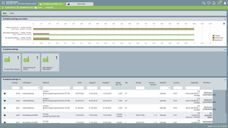LMU research transfer: several start-ups attract 7-figure investments
In successful funding rounds, three LMU spin-offs have brought in investments worth millions.
Tubulis, Smart Reporting, and Eisbach Bio have successfully attracted new investor funding. The new capital will enable the companies, for example, to expand their research and development activities. Tubulis and Eisbach develop new therapeutic approaches and active agents for cancer treatment, while Smart Reporting provides software for the digitalization and efficient management of documentation, designed particularly to help radiologists and pathologists.
Funding round brings Tubulis 128 million euros
Tubulis GmbH was founded in 2019 by a team of molecular biologists led by Professor Heinrich Leonhardt at the LMU Biocenter and Professor Christian Hackenberger from the Leibniz Research Institute for Molecular Pharmacology Berlin (FMP Berlin). The company develops technologies for the manufacture of antibody-drug conjugates (ADCs), whereby stable links are created between toxic substances and antibodies that bind specifically to cancer cells. The active agents are then released inside the cancer cells, killing them. “In contrast to conventional chemotherapeutics, ADCs do not attack the entire body and therefore have fewer side effects,” says Heinrich Leonhardt. As such, they have the potential to make cancer therapies more effective and gentler on the body.
"In contrast to conventional chemotherapeutics, ADCs do not attack the entire body and therefore have fewer side effects", Heinrich Leonhardt.
In a new funding round, Tubulis managed to attract a total of 128 million euros. The money comes from various international investors specialized in biotech. With the money from the funding round, the start-up wants to bring two active agent candidates to clinical trial. One active agent targets ovarian and lung cancer, while the second targets a molecule that is often overexpressed in solid tumors. In addition, it plans to expand its development of new technologies and found a subsidiary in the United States.
“Our goal is to establish Tubulis as a global leader in ADC development. Our next step will be to conclude the clinical phase in order to harness the full capability and therapeutic value of ADCs,” says Dr. Dominik Schumacher, research group leader at LMU until 2020 and now CEO and co-founder of Tubulis.
Successful funding round concludes for Smart Reporting with investments of 23 million euros
Smart Reporting GmbH has set itself the goal of simplifying manual and repetitive processes in medical documentation while improving quality and data standardization, particularly in the fields of radiology and pathology. To do this, the company specializes in the automation of routine tasks and guarantees consistency by combining expert medical knowledge with leading technology.
Recently, Smart Reporting successfully concluded a funding round which brought the company 23 million euros. Two new investors have come on board – TVM Capital Life Science and Bayern Kapital. With the new capital, the company intends, among other things, to strengthen its presence in North America and Australia. "Our manufacturer-independent Smart Reporting software offers a fully voice-controlled and data-driven documentation solution for doctors, which forms the basis for workflow automation and machine-readable data," says Co-CEO Professor Wieland Sommer, who launched Smart Reporting as an LMU spin-off in 2014. In this way, Smart Reporting makes a decisive contribution to digitalization in clinical settings.
Eisbach Bio attracts 4.5 million US dollars in funding round
Eisbach Bio GmbH develops allosteric drugs for precision oncology, which are designed to disrupt the molecular mechanisms that are vital to the reorganization of tumor genomes. “By combining the targeting of now established genetic vulnerabilities with the company’s proprietary drug discovery platform ALLOS, Eisbach is pioneering the development of first-class therapies with few side effects,” says LMU Professor Andreas Ladurner, co-founder and Chief Scientific Officer of Eisbach.
"By combining the targeting of now established genetic vulnerabilities with the company’s proprietary drug discovery platform ALLOS, Eisbach is pioneering the development of first-class therapies with few side effects", Andreas Ladurner.
In the most recent funding round, Eisbach received 4.5 million US dollars to carry out a clinical study on the tumor-inhibiting molecule EIS-12656. The financial resources will be provided by the Cancer Focus Fund, an oncology-oriented investment fund from the United States which invests in promising cancer therapies that are entering human clinical trials.
Another related success of the Eisbach team was the FDA approval for the clinical testing of EIS-12656 in the United States. The small molecule EIS-12656 suppresses the chromatin remodeling activity of the molecular machine ALC1, which is triggered by DNA damage, and can be thus used to suppress the growth of cancer cells. “EIS-12656 selectively targets tumors without identifiable effects on normal tissue,” says Dr. Adrian Schomburg, co-founder and CEO of Eisbach.
Other news from the department business & finance
These products might interest you
Most read news
More news from our other portals
Something is happening in the life science industry ...
This is what true pioneering spirit looks like: Plenty of innovative start-ups are bringing fresh ideas, lifeblood and entrepreneurial spirit to change tomorrow's world for the better. Immerse yourself in the world of these young companies and take the opportunity to get in touch with the founders.


























































